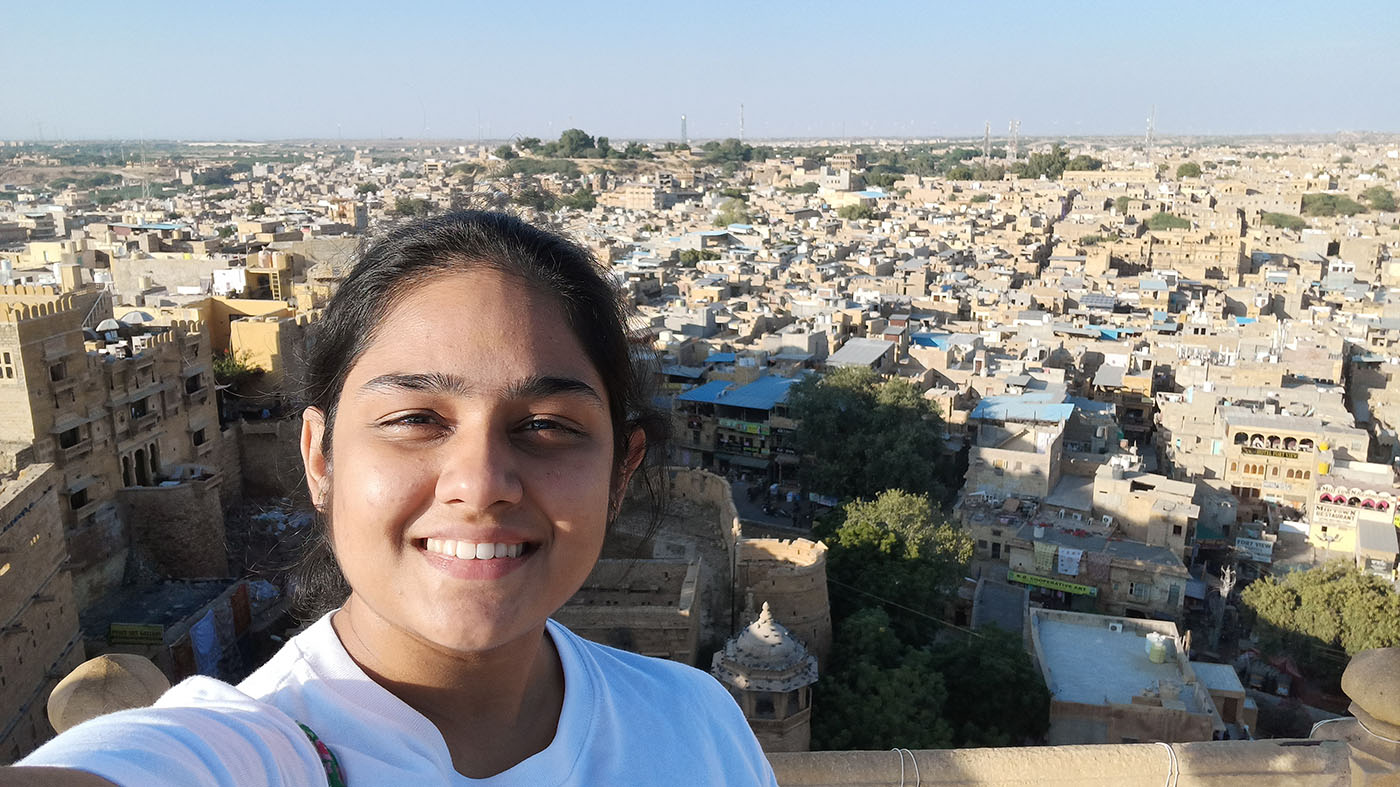Highlights
Meet a CQTian: Nayanthara Prathap
 Nayanthara is pictured here during a trip to Jaisalmer, Rajasthan, in India in December 2023.
Nayanthara is pictured here during a trip to Jaisalmer, Rajasthan, in India in December 2023.
Who are you and how did you come to be at CQT?
I’m Nayanthara from Bengaluru, India. I’m currently a research intern in the group of Principal Investigator Patrick Rebentrost. In 2023, I participated in the Quantum Bootcamp organised by the National Quantum Computing Hub in collaboration with SoftServe Inc and CQT. It was during the bootcamp that I met Li Xiufan, a PhD student from CQT. I asked him if there were any opportunities at CQT. He referred me to Patrick and here I am now.
How did you come to know about the Bootcamp?
I was a Masters student at the School of Computing (SoC). I happened to see a poster for the Bootcamp at SoC and thought it sounded fun. I had very little background but applied anyways.
When I was offered a place, it was a hard decision to go. At that time, I was in my final semester and had to finish a compulsory capstone project. I had to decide if I wanted to go for the Bootcamp or focus on my project. Since I didn't know when I would next get such an opportunity, I decided to go for the Bootcamp while also pursuing my capstone project simultaneously. It turned out well in the end and I graduated with my Masters in January this year.
Could you share more about your experience at the Bootcamp?
There was a lot of conceptual theory we had to learn and there were also weekly projects. It was very intensive for an eight-week bootcamp. It was a humbling experience, and I realised the importance of domain knowledge. Without domain knowledge — in this case it was quantum — I couldn’t understand the logic of the code even though we were coding. Despite being a computer science student, I still found the coding knowledge required for our weekly projects to be challenging. But this pushed me to embrace learning. My peers at the bootcamp were very supportive which accelerated my learning and ability to contribute to the projects.
We also got to meet a lot of people, from research institutes like A*STAR to industry companies like IQM and Nvidia. It was very wholesome.
What drew you to quantum computing?
During the pandemic when we were all at home, I came across some YouTube videos from IBM on quantum. That was when I first started thinking about quantum. I then signed up for the maiden Qubit by Qubit, the flagship programme by The Coding School in collaboration with IBM. I became busy with my undergrad studies but those ideas stayed with me. And here I am today, doing quantum!
Do you intend to stay in quantum?
I really want to pursue it. I’ve recently just started getting the gist of what we are doing because there were so many gaps I had to fill and learn. We're benchmarking our algorithm on different state-of-the-art quantum computers as well as looking at real-world applications to apply the algorithm sensibly.
Could you tell us more about the algorithm?
We're working on classical combination of variational quantum states. We show that different quantum states, variational or not, can be combined via classical pre- and post-processing to study the extent of reach of near-term quantum computers. I've been looking at the code and figuring out ways we can make the calculation more accurate and possibly minimize the steps.
Are you enjoying the work?
Yes, I am. It is challenging but I like it. My group is very supportive. I never thought in the span of two years I would be where I am. When I enrolled for my Masters, my motive was to be a software engineer and climb the corporate ladder. But now it is so different. It speaks volumes about how unpredictable life can get.
You also entered CQT’s poetry call.
I love writing, I've been writing occasionally since 2016. I don't know if I can call it a hobby, rather it may be a form of catharsis. During the pandemic, I had a lot of time, so I wrote more and started to fine-tune my writing but haven’t been consistent at all. Then I saw the poetry challenge at CQT and thought I would give it a try. If there’s anyone reading this and is curious about what I write, feel free to check out my very minimally designed, amateurish blog.
What are your other interests?
I love reading and enjoy reading about philosophy and economics. I have been reading a lot of works by Marcus Aurelius lately. I like the idea of simplicity he presents, that less is more. I think reading his works have given me perspective and has helped keep myself grounded. Currently, I’m reading a book on economics by Raghuram Rajan called I Do What I Do. He was the Governor of the Reserve Bank of India for three years and the book is about his commentary on the Indian economic landscape as well as illustration of some core economic concepts in a readily accessible way.






